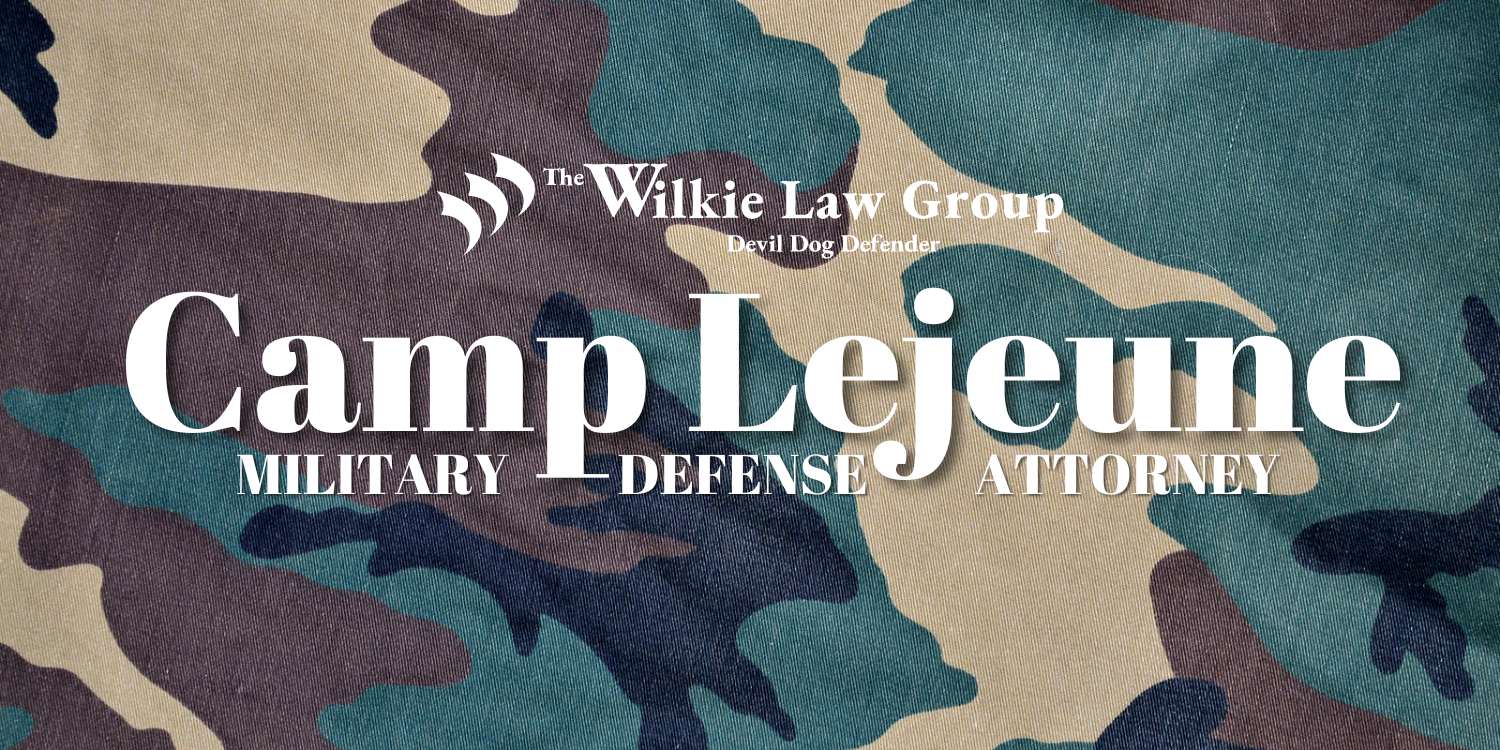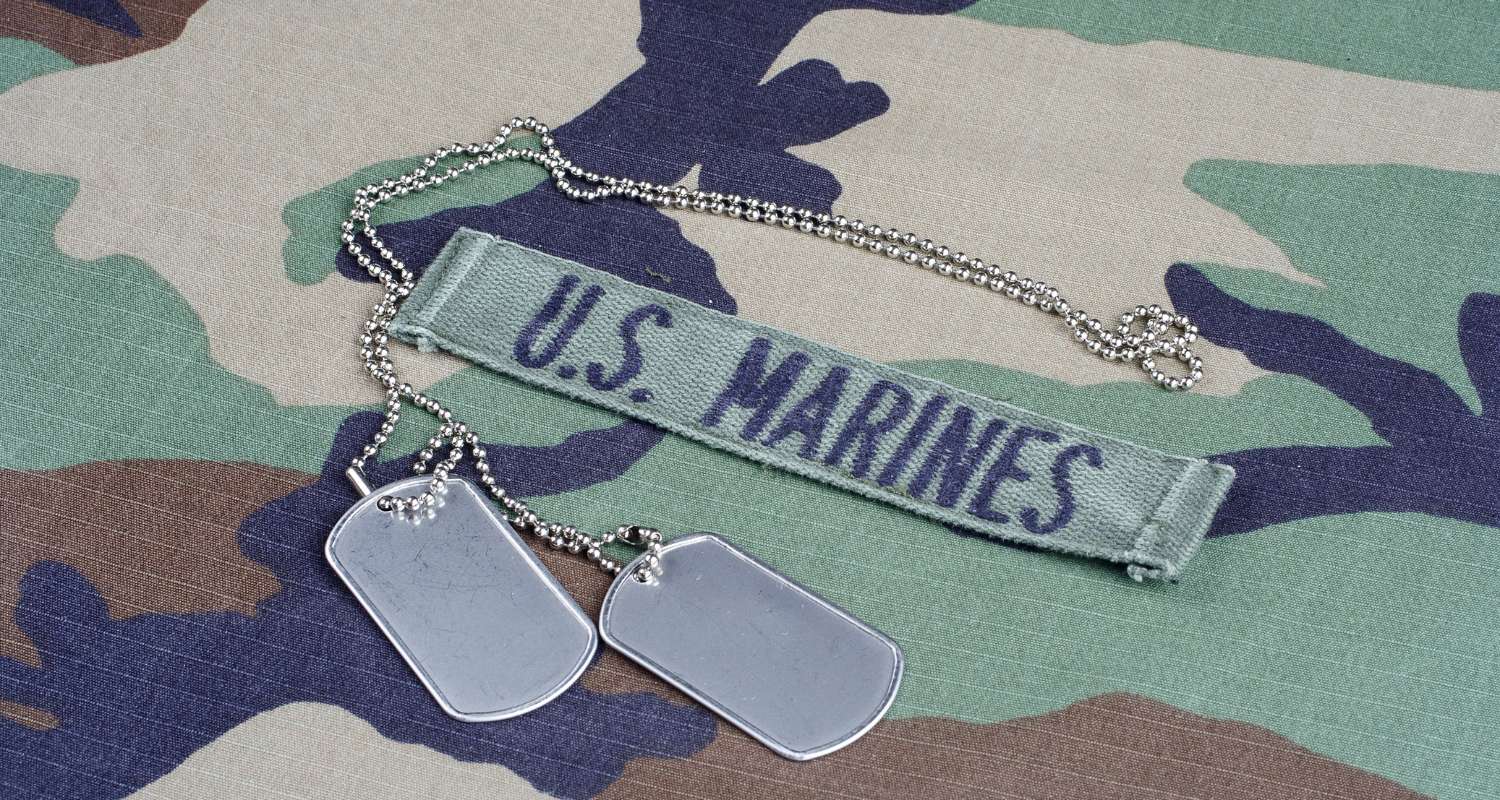Camp Lejeune Criminal Defense Lawyer
Experienced Military Criminal Defense Lawyer at Camp Lejeune in Jacksonville, NC
Home » Camp Lejeune Criminal Defense Lawyer
Military Counsel
Criminal Defense for Marine Corps Base Camp Lejeune
Life in the military can be very challenging for service members. Military personnel often face extreme scrutiny on a daily basis and are held to exceptionally high standards of conduct, facing the possibility of severe consequences for even minor infractions. This heightened level of oversight stems from the military’s ongoing commitment to upholding its image and maintaining the integrity of the defense services. As a result, service members are frequently subject to strict disciplinary measures, making it critical for them to navigate these situations carefully to protect their careers and reputations.
That’s why, if you’re facing criminal charges, it’s important that you seek an attorney based just outside the gate of Marine Corps Base Camp Lejeune. Based in Jacksonville, North Carolina, experienced Camp Lejeune criminal defense lawyer Aden Wilkie of The Wilkie Law Group has the knowledge, skill, and legal maneuver to put up an aggressive defense against the charges levied against you.

Regardless of whether you’re accused of a relatively minor offense or a serious felony, a conviction could cost you your military career. Not only that, but it could also cost you a great deal of time and money and land you in the brig. What’s more, you will have a permanent criminal record, which can cast a far-reaching and long-lasting shadow over your hard-earned reputation. So, if you’re a service member facing disciplinary action or criminal charges at Camp Lejeune, be sure to contact a military defense lawyer at The Wilkie Law Group today as soon as possible to protect your rights and your future. Simply give us a call at (910) 333-9626 or send a message online to schedule a consultation today.
Understanding the Military Criminal Justice System
The military justice system operates separately from the civilian court system, with its own rules, procedures, and penalties for service members facing criminal charges. Governed by the Uniform Code of Military Justice (UCMJ), this system covers a broad range of offenses, from minor violations to serious felonies, and subjects military members to a strict code of conduct.
When accused of a crime, service members may face a range of disciplinary action, including court-martials, which are military trials that can lead to severe consequences, including imprisonment, dishonorable discharge, and loss of military benefits, among various other penalties.
Experienced military defense attorneys like Aden Wilkie and his team at The Wilkie Law Group play a critical role in defending service members in military proceedings. With a deep understanding of how the military criminal justice system functions, they can challenge the evidence, negotiate with prosecutors and military law enforcement officers, and provide a strong defense, ensuring that their clients are protected at every step.

Camp Lejeune Legal Defense Services
Aden Wilkie and his legal team provide skilled legal guidance for military members facing a variety of criminal charges or otherwise requiring legal service. Whether you are facing a minor misconduct offense or are called to a court-martial trial, the Devil Dog Defender will meticulously and strategically craft your defense. Here are some of the many areas of counsel we provide:
Military Investigations
The first and seemingly most simple rule for service members facing military investigation is simple: talk to a military defense lawyer immediately. During the course of military investigations, it’s not uncommon for the commanding officers or other convening authority to make targets of investigations feel as if they’re doing something wrong if they choose to seek outside counsel. Don’t let this deter you. When you reach out to Aden Wilkie, you can rest assured knowing that as both a lawyer and a former Marine himself, he genuinely has your best interest at heart and will work tirelessly to defend your rights and future during the investigative phase and beyond.
Administrative Discharge
Military members may be involuntarily separated from the military by administrative discharge. While the basis for administrative discharge varies between branches of service, the process is analogous in the civilian world to being fired. Due to the possible negative characterization of discharge associated with an involuntary separation, the Ad Sep process affords you much greater due process than many circumstances found in the civilian world. At The Wilkie Law Group, an experienced military administrative discharge attorney on our team can represent you if you’re facing administrative discharge processing.
Adverse Administrative Action
While it may vary between each service branch, all have certain adverse administrative actions. A commanding officer can take these actions against his or her subordinates for underperformance on the job or minor misconduct that does not rise to the level of an Article 15 or Court-Martial. Alternatively, it may be something the commander wishes to address in a forum that is relatively quick and affords the recipient less ability to fight the issue or be entitled to any real due process. Even at this lower end of the spectrum of quasi-legal issues involving your command, it is critical to seek out assistance from an experienced adverse administrative actions attorney like Aden Wilkie.
Security Clearance
Security clearance is a required designation for any government contractor or employee who performs work for the U.S. government that requires access to classified information. Those who are granted security clearance are an elite few who have earned the trust of the government. However, security clearances can be taken away at any time for a number of reasons. For example, you might have your security clearance taken away if you have too much debt, because you provided a false answer on your SF-86, you defaulted on your mortgage payments, or even due to traffic violations. As a skilled North Carolina security clearance lawyer, Aden Wilkie works with military and civilian people to restore their security clearance. He can also provide counsel for those applying for security clearance.
Article 15 Counseling
Your command is authorized to deal with minor offenses or infractions of the UCMJ by offering you the opportunity to have a disciplinary proceeding pursuant to Article 15 of the UCMJ rather than a court martial. During this hearing, a commanding officer reviews the facts and determines whether the service member is guilty and what punishment, if any, is appropriate.
When offered an Article 15 or non-judicial punishment (NJP), you can either accept the action offered by your command or turn it down and demand a court-martial trial. Regardless of your decision, it’s always best to speak to a civilian defense attorney with experience in Article 15 counseling for knowledgeable advice and guidance.
Counsel for Board of Inquiry Hearings
A Board of Inquiry (BOI) hearing is an administrative proceeding used by the military to determine whether an officer should be separated from service due to misconduct, substandard performance, or other issues that negatively impact their ability to serve. The BOI is a panel of three officers of senior rank to the accused who hold a hearing, during which they take evidence and hear arguments. The required finding of the members of a Board of Inquiry is to determine if, by a preponderance of the evidence (more likely than not), the misconduct was committed by the respondent (the person facing elimination or separation). If the board concludes there was probable cause that the respondent committed the misconduct, they must then make a recommendation on whether the officer should be retained or discharged from the military.
Having a Board of Inquiry defense attorney on your side during a hearing is critical because the outcome can have a profound impact on your military career and future. A skilled attorney can present a compelling case in your defense, challenge any weak or unfair evidence, and work to prevent a discharge and minimize the potential consequences. Without proper legal representation, you may risk an unfavorable result that could lead to the end of your military career, loss of benefits, and damage to your personal and professional reputation.
Sexual Assault Defense
UCMJ Article 120 outlines specific criminal offenses related to sexual assault, including rape charges and other forms of abusive sexual contact. These laws apply to all service members in the United States and can encompass acts of physical abuse, threats, and unwanted sexual contact such as groping or repeated advances.
Facing charges under the UCMJ can be an incredibly stressful experience, especially those involving sexually-driven crimes given the weight these cases often carry. However, it’s important to remember that these charges can sometimes be driven by emotion rather than logic. Don’t lose hope—you have the right to defend yourself, and with the help of an experienced Camp Lejeune criminal defense lawyer like Aden Wilkie, you can effectively fight these accusations.
Military Power of Attorney
Due to the nature of military duties, it is common for service members to require a power of attorney to delegate their responsibilities while they are away. To ensure their affairs are properly managed, they must officially designate a trusted representative, such as a spouse, friend, or sibling, to handle their legal and financial matters.
At The Wilkie Law Group, we also provide military family law services in addition to criminal defense and are ready to assist service members in obtaining a military power of attorney, ensuring their affairs are in capable hands.
Medical Discharge
The medical discharge process involves evaluating a service member’s health condition to determine if they are unfit for continued service. This process typically includes a medical evaluation board (MEB) and a physical evaluation board (PEB), which assess the severity of the injury or illness and its impact on the individual’s ability to serve.
An attorney like Aden Wilkie can be highly beneficial during the military medical discharge process by ensuring that your rights are protected, assisting in gathering necessary medical evidence, and advocating on your behalf to ensure that you receive a fair evaluation and the proper benefits.
Military Record Correction
If you feel that your military records are incorrect or unjust, it’s crucial to take action to challenge this injustice. The outcomes determined by your branch’s review board can significantly affect your future and that of your family. To have the best chance at restoring your reputation and amending your records, be sure to work with an experienced military record correction attorney like Aden Wilkie. With his extensive background in both military service and defending service members in legal proceedings, Wilkie is well-equipped to guide you through your DRB or BCMR case and help correct any inaccuracies.
Drug Testing
As an experienced military defense attorney and Marine veteran, Aden Wilkie has a thorough understanding of the unique challenges that military members face, particularly when confronted with drug testing and drug abuse allegations in the military. Having spent time in the service himself, Aden brings firsthand knowledge and a deep commitment to defending the rights and futures of military personnel and ensuring they receive fair treatment.
If you need experienced legal guidance related to Marine Corps drug testing or any military drug testing matter, The Wilkie Law Group is ready to provide the support you need.
Court Martial Defense
Court martials are governed by a complex set of rules, including the Uniform Code of Military Justice (UCMJ), the Rules for Court-Martial (RCM), the Military Rules of Evidence (MRE), and other applicable constitutional provisions. Additionally, higher court rulings, service-specific regulations, and local rules of court further shape the court-martial process. Unlike civilian courts, the military criminal justice system has its own distinct procedures, which is why those facing a court-martial require a defense attorney with specific military and court-martial trial experience.
There are three types of courts-martial: Summary Court Martial, Special Court Martial, and General Court Martial, each varying in severity and potential consequences. A Summary Court Martial only involves a military judge, while a Special Court Martial includes a judge, trial counsel, and a prosecutor. A General Court Martial is the most serious of the three proceedings, and in these cases, the accused may choose whether to opt for a trial by jury or by military judge alone.
No matter what level of court-martial you face, be it a Summary Court Martial, Special Court Martial, or General Court Martial, the process can be complex, making it essential to have an experienced Camp Lejeune court martial lawyer to represent you effectively. Your future, livelihood, reputation, and even your freedom are at stake, depending on how well your defense is presented. If you are facing a court-martial, contact The Wilkie Law Group immediately. With extensive knowledge of military law and experience in court-martial defense, they can guide you through this challenging time and help protect your rights.
UCMJ Article 134 Defense
There are several articles within the Uniform Code of Military Justice, or UCMJ, each covering different criminal offenses within the military criminal justice system and their potential penalties. Article 134 of the UCMJ, known as the “General Article,” addresses a range of conduct that is prohibited for military members, including adultery, fraternization, disorderly conduct, child pornography, obtaining services under false pretenses, and more.
Each crime alleged under UCMJ Article 134 has the added burden of requiring the government to prove either the conduct was discrediting to the armed forces or detrimental to good order and discipline. Aden Wilkie’s military experience and firsthand knowledge of UCMJ regulations make him well-equipped to defend military men and women against such charges.
UCMJ Lawyer for Service Members
For a military member who has been charged with a crime, the risks are very high. Finding someone who recognizes the seriousness of the situation and can zealously advocate for them is crucial, as their career and everything they’ve fought for are on the line.
Some of the more common UCMJ violations that attorney Aden Wilkie defends against at Marine Corps Base Camp Lejeune include the following:
- UCMJ Article 80 – Attempts
- UCMJ Article 81– Conspiracy
- UCMJ Article 85 – Desertion
- UCMJ Article 86 – Absence without leave
- UCMJ Article 88 – Contempt toward officials
- UCMJ Article 89 – Disrespect toward superior commissioned officer; assault of superior commissioned officer
- UCMJ Article 90 – Willfully disobeying super commissioned officer
- UCMJ Article 91 – Insubordinate conduct towards warrant officer, noncommissioned officer, or petty officer
- UCMJ Article 92 – Failure to obey an order or regulation
- UCMJ Article 93 – Cruelty and maltreatment, including military hazing
- UCMJ Article 94 – Mutiny and sedition
- UCMJ Article 105 – Forgery
- UCMJ Article 107 – False official statements; false swearing
- UCMJ Article 112 – Drunkenness, disorderly conduct, and other incapacitation offenses
- UCMJ Article 112a – Wrongful use, simple possession, etc., of controlled substances
- UCMJ Article 113 – Drunken and reckless operation of a vehicle, aircraft, or vessel
- UCMJ Article 118 – Murder
- UCMJ Article 119 – Manslaughter
- UCMJ Article 120 – Rape and sexual assault generally
- UCMJ Article 121 – Larceny and wrongful appropriation
- UCMJ Article 122 – Thefts of personal property; robbery
- UCMJ Article 124 – Frauds against the United States
- UCMJ Article 125 – Kidnapping
- UCMJ Article 126 – Arson; burning property with intent to defraud
- UCMJ Article 127 – Extortion
- UCMJ Article 128 – Assault
- UCMJ Article 128a – Maiming
- UCMJ Article 128b – Domestic violence
- UCMJ Article 129 – Burglary; unlawful entry
- UCMJ Article 130 – Stalking
- UCMJ Article 131 – Perjury
- UCMJ Article 132 – Retaliation
- UCMJ Article 133 – Officer misconduct; conduct unbecoming of an officer and gentlemen
- And all other violations of UCMJ Articles

Potential Penalties Within the Military Justice System
When a service member is found guilty of a criminal offense under the military justice system, the potential penalties vary widely depending on the severity of the offense. For minor offenses or less serious misconduct, disciplinary actions may include reduction in rank, forfeiture of pay, extra duty, or other administrative penalties, all of which can severely impact the service member’s future career prospects, personal reputation, and military benefits. For example, you could lose your eligibility for benefits such as:- Disability compensation
- Life insurance for survivors/ dependents
- GI bill
- Pension for widow or children of fallen service members
- Hospital care
- Medical/dental care
- Burial benefits
- Special housing
- Vocational rehabilitation
- Survivor educational assistance

Why Should I Hire a Civilian Attorney Instead of Active Military Counsel?
If you’re facing criminal charges at Camp Lejeune, there are several reasons why hiring a civilian lawyer as opposed to an active duty military lawyer or staff judge advocate may be in your best interest. For one, when you accept free legal counsel provided by the military (which is akin to a public defender in civilian criminal cases), your case is assigned to an attorney based merely on who is available at that given moment, meaning your own preferences are not taken into account. Meanwhile, when you hire a private civilian defense lawyer, you have the power to choose someone you trust and feel comfortable putting your case into their hands. You have the ultimate decision in who represents you, so you can factor in your own personal preferences and choose someone who meets all the standards and qualities that matter to you.
Another huge advantage to hiring civilian-military defense counsel is knowing that they are completely dedicated to your case and will put in whatever time and effort it takes to present the strongest possible defense. Because military-provided counsel does not have a say in the cases they receive, they must take every case that comes through their door, meaning they are often extremely bogged down with cases. In fact, the JAG attorneys at Camp Lejeune work in one of the busiest defense offices of the entire Marine Corps organization, which translates to less time dedicated to building your defense. Aden Wilkie, on the other hand, works for himself as a private attorney, which means only he gets to choose which cases he accepts and when he accepts them. He is very careful not to overdo his caseload so that he can put enough time and resources into the cases he takes on.
These are only a few reasons why its preferable to hire a private civilian attorney vs. military counsel. Schedule a consultation to speak with Aden Wilkie today and see for yourself why he is the best fit for you.

Experienced Military Defense Attorney in Jacksonville, NC
At The Wilkie Law Group, our military defense attorneys offer the experience and aggressive defense you need when facing criminal accusations within the military justice system. We understand the importance of protecting your legal rights and are prepared to build a strong defense against even the most powerful military organizations. Unlike military-provided defense counsel, our Marine Corps Base Camp Lejeune defense attorneys operate free from the constraints of the military chain of command, supervisory chains, or ranking pressures. This independence ensures that nothing deters us from aggressively pursuing your best interests.
An attorney like Aden Wilkie is focused solely on providing competent representation for his clients, unconcerned with factors that may affect JAG attorneys, such as evaluation reports or promotion opportunities. Unlike active-duty military defense lawyers, who are often subject to the limitations imposed by their command structure, Mr. Wilkie works independently to fully represent his clients’ interests without any outside influence. When the Devil Dog Defender takes on your case, you can be confident that his only priority is achieving the best possible outcome for you.
Hire the Best – Call the Devil Dog Defender Today
A civilian attorney like Aden Wilkie, aka the Devil Dog Defender, has the flexibility to defend clients in ways that active-duty military attorneys, who share the same uniform as the government prosecutors and commanders, cannot. With this independence, Wilkie can aggressively protect your rights and pursue your best interests without the constraints that come with military command structures.
If you’re facing criminal charges, it’s crucial to remain silent and consult an experienced military defense attorney right away. In addition to serving the Camp Lejeune area, our criminal defense office offers Fort Bragg criminal defense services as well as defense for service members at military installations across North Carolina and the entire nation. Contact The Wilkie Law Group at (910) 333-9626 or reach out online to schedule a confidential consultation regarding your case.





